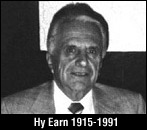Overview
Made In Canada | Product Excellence | Creative & Innovative
| Competitive Pricing |
Cover All Species | 100% Canadian Owned | Contributes to the Agricultural Industry
Superior customer service, competitive pricing and a history
for inventing horse health & livestock supplies make Dominion Veterinary Laboratories a winner
 In
1950 a chemist by the name Hy Earn made a major contribution
to the agricultural industry by inventing an ointment
that prevented cannibalistic tendencies among chickens
suffering from a protein deficiency. Earn's discovery
was so successful that it led to the creation of the
family owned and operated Dominion Veterinary Laboratories
Ltd.
In
1950 a chemist by the name Hy Earn made a major contribution
to the agricultural industry by inventing an ointment
that prevented cannibalistic tendencies among chickens
suffering from a protein deficiency. Earn's discovery
was so successful that it led to the creation of the
family owned and operated Dominion Veterinary Laboratories
Ltd.
Today, as a direct result of Hy Earn's
achievements, family, and work ethics, Winnipeg-based
Dominion Veterinary Laboratories Ltd. has a wide spectrum
of products for the livestock industry. More than 100
drug formulas continually contribute to the high standards
of both Canadian and international agricultural industries.
In an industry dominated by global
giants, Dominion Veterinary Laboratories knows you don't
have to be big to be a winner. Faced with the challenge
of entering new markets where established players have
the advantage, Western Canada's largest manufacturer
and distributor of veterinary pharmaceuticals and instruments
has taken quality and innovation to new heights.
"It's important to look overseas
for growth," says Dominion President Sheldon Earn.
"Canada is well known for its cleanliness and as
a good place to manufacture products. We try to focus
on customer relations, deliver products on time and
set very reasonable prices overseas."
Exports now account for more than
60 percent of Dominion's pharmaceutical sales.
"We got into the U.S. market
about five years ago," says Shane Earn, Dominion's
Export Manager and son of Sheldon Earn. "Strangely,
it happened when the U.S. government approached us.
My mother got the sale with the U.S. Food and Drug Administration!"
Shane's brother is also a key part of Dominion, making
it a classic family business.
Export clients tend to be governments
and larger clinics abroad; they buy cattle supplies and horse supplies directly
or through Dominion's distribution centres in Trinidad,
Dubai, Saudi Arabia, Kuwait, Jordan and Korea.
Dominion spends nearly five percent
of its revenue on research and development, a respectable
amount but obviously tiny compared to the research budgets
of the large drug companies. And it continues to enjoy
success exporting products that Shane's grandfather
(a chemist) developed decades ago. These include the
product for horse health which the U.S. Food and Drug Administration
wanted to buy, and a remedy called "Stop Pick",
the first product to prevent cannibalism in chickens.
Dominion uses personal contacts, hard
work and good timing to make up for its lack of size.
Using his contacts and research on the Internet, Sheldon
Earn persuaded a Finnish company to grant international
rights to a product that multinational companies have
since tried to buy.
"Price and personality are the
two keys to our export success," says Sheldon.
"We make sure we're very competitive and let the
customer know they have someone they can call any time,
even after five years. It's a little like a marriage.
We make them feel loved."
Dominion Veterinary Laboratories received
the Canada Export Award in 1999, which meant recognition
within Canada and abroad.
"It shows that a family-owned
company can make an impact in foreign trade," says
Sheldon. "Exports are a great opportunity for us.
If you notice a new highway paved with opportunity,
you'd be silly not to take the on-ramp and try it out."